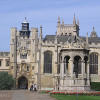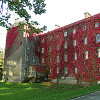The Institute's Research Centres
Centre for Analytic Criminology |
|
The Centre for Analytic Criminology aims to advance, through theory development and empirical testing, a general, dynamic and mechanism-based explanation of crime and its causes to inform effective crime prevention policies and practices. |
Justice and Society Research Centre |
|
The Justice and Society Research Centre focuses on both criminal and associated social justice issues in a broad range of community and institutional settings. The Centre utilises rigorous, creative and participatory research methods to explore questions relating to gender, race, family, youth justice, probation, imprisonment, and victimisation. |
Jerry Lee Centre for Experimental Criminology |
|
The Jerry Lee Centre conducts and synthesizes randomized controlled trials of policing, criminal justice and crime prevention programmes, in tandem with training doctoral and post-doctoral students the methods and practices of experiments in crime and justice. The Centre is also undertaking new experiments on a variety of innovations for preventing serious crime, including homicide. |
Centre for Penal Theory and Ethics |
|
The Centre for Penal Theory and Ethics brings together leading philosophers, criminologists, and criminal-law theorists to explore ethical and philosophical issues in criminal law and criminal justice. The Centre’s mission is to ensure that criminal justice research and theory remains in constant dialogue with the best thinking in the fields of ethics, political philosophy and jurisprudence. |
Prisons Research Centre |
|
The Prisons Research Centre aims to provide a stimulating research environment in which they investigate:
|
Violence Research Centre |
|
The Violence Research Centre aims to conduct rigorous interdisciplinary research on the causes, prevention and consequences of interpersonal violence in a variety of settings. It takes an interdisciplinary perspective that draws on theoretical approaches and empirical findings from criminology, psychology, biology, political science, sociology and history. |
The Institute also hosts:
The Centre of Global Human Movement |
 |
The Centre for the Study of Global Human Movement aims to build on strong institutional engagement by the University with one of the greatest societal challenges of the 21st Century, that of human movement, dispersal, mobility, and migration to create a transdisciplinary centre of research excellence. |
The Comparative Penology Group |
|
The Comparative Penology Group are working on a five year project titled: 'Penal policy making and the prisoner experience: a comparative analysis'. The research is based in England & Wales, and Norway, and involves four inter-related studies of (a) penal policy making and the penal field (b) the experience of entry into and release from custody (c) the daily experiences of female prisoners and imprisoned sex offenders, and (d) prisoners in the most secure parts of each jurisdiction's prison system. |
Members of the Institute are also involved in the interdisciplinary research activities of:
The Cambridge Socio-Legal Group |
|
The Cambridge Socio-Legal Group is an interdisciplinary discussion forum promoting debate on topical socio-legal issues and empirical research methodology. It is affiliated with several departments across the University, including the Faculty of Law, the Institute of Criminology, and the Centre for Family Research and Physiology, Development & Neuroscience (PDN). |








